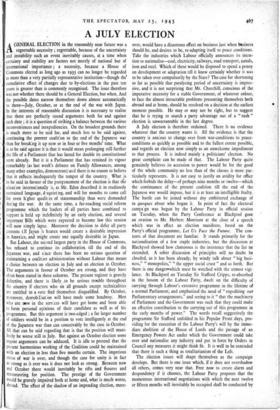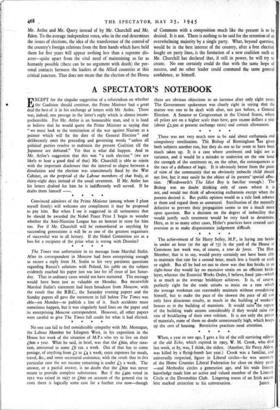A JULY ELECTION
itGENERAL ELECTION in the reasonably near future was a regrettable necessity ; regrettable, because of the uncertainty and instability such an event inevitably causes, at a time when certainty and stability are factors not. merely of national but of international importance ; a necessity, because a House of Commons elected as long ago as 1935 can no longer be regarded as more than a very partially representative institution—though the cumulative effect of changes due to by-elections in the past ten years is greater than is commonly recognised. The issue therefore was not whether there should be a General Election, but when. And the possible dates narrow themselves down almost automatically to three—July, October, or at the end of the war. with Japan. In the interests of reasonable discussion it is necessary to realise that there are perfectly sound arguments both for and against each date ; it is a question of striking a balance between the various inconveniences and inexpediencies. On the broadest grounds there is much more to be said for, and much less to be said against, continuing the present coalition to the end of the Japanese war than for breaking it up now or in four or five months' time. What is to be said against it is that it would mean prolonging still further the life of a Parliament that has listed for double its constitutional term already. But it is a Parliament that has retained its vigour remarkably (as last week's debates on Family Allowances, among many other examples, demonstrate) and there is no reason to believe that it reflects inadequately the temper of the country.. What is to be said in favour of the postponement of the election is that die situation internationally is, as Mr. Eden described it in studiously restrained language, d squiet:ng, and will for months to come call for even Wgher qualit:es of statesmanship than were demanded during the war. At the same time, a far-reaching social reform programme which the leaders of- all parties have combined to support is held up indefinitely by an early election, and several important Bills which were expected to become law this session will'nOw simply lapse. Moreover the decision to defer all party contests till japan s beaten would, create a, desirable impression in America, and might create one equally desirable in Japan.
But Labour, the second largest party in the House of Commons, has refused to continue • its collaboration till the end of the Japanese war, and since" there has been no serious question of maintaining a coalition administration without Labour that meant a choice between.an election in July and an election _in October. The arguments in favour of October are strong, and they have often been stated in these columns. The present register is gravely defectiVe, and there is likely .to be serious trouble throughout the country if electors who on all grounds except technicalities are entitled to a vote find themselves disqualified. By October, moreover, demob:lint:on will have made some headway. Men uho are now in the serv:ces will have got home and been able to form personal opinions of their candidate as well as of his programme. But this argument is two-edged ; a far larger number of soldiers would be in a position to vote intelligently at the end of the Japanese war than can conceivably be the case in October. All that can be said regarding that is that the position will mani- festly be worse still in July. But against an October election some Cogent arguments can be adduced, It is idle to pretend that the present harmonious working of the Coalition could be maintained with an election in less than five months certain. The imperious stress of war is over, and though the case for unity is in fact as strong as it ever was it does not look as strong. Between now and October there would inevitably be rifts and fissures and manoeuvring for position. The prestige of the Government would be gravely impaired both at home and, what is much worse, abroad. The effect of the shadow of an impending election, more- over, would have a disastrous effect on business just when business should be, and desires to be, re-adapting itself to peace conditions. Take the industries which Labour officially announces its inten- tion to nationalise—coal, electricity, railways, road transport, canals, iron and steel. Which of these would be disposed to spend a penny on development or adaptation till it knew certainly whether it was to be taken over compulsorily by the State? The case for shortening so far as possible that paralysing period of uncertainty is impres- sive, and it is not surprising that Mr. Churchill, conscious of the imperative necessity for a stable Government, of whatever colour, to face the almost intractable problems presenting themselves both abroad and at home, should be resolved on a decision at the earliest moment possible. He may or may not be right, but to suggest that he is trying to snatch a party advantage out of a " rush " election is unwarrantable in the last degree.
A July election is therefore ordained. ' There is no evidence whatever that the country wants it. All the evidence is that the country is anxious to change over froth war-conditions to peace- conditions as quickly as possible and to the fullest .extent possible, and regards an election now simply as an unwelcome impediment to that process. It is indeed mainly a politicians' election. No great complaint can be made of that. The Labour Party quite genuinely believes its accession to power would be for the good of the whole community no less than of the classes it more par- ticularly represents. It is not easy to justify an avidity for office which forbids the delay—of perhaps nine months or twelve—which the• continpance of the present coalition till the end of the Japanese war would impose, but it is at least an intelligible frailty. The battle can be joined without any embittered exchange of to quoques about who began it. In point of fact the electoral campa-gn was begun by the Labour Party in official session on Tuesday, when the Party Conference at Blackpool gave an ovation to Mr. Herbert Morrison at the close of a speech which was in effect an election manifesto, based on the Party's official programme, Let Us Face the Funire. The con- tents of that document are familiar. It stands primarily for the nationalisation of a few staple industries, but the discussion at Blackpool showed how clamorous is the insistence that the list be extended. A sober discussion of principles will no doubt be clouded, as it has been already, by windy talk about " big busi- ness," " monopolies," " the upper social crust " and so forth. But 'there is one danger•which must be watched with the utmost vigi- lance. At Blackpool on Tuesday Sir Stafford Cripps, re-absorbed in the bosom of the Labour Party, dwelt on the difficulty of carrying through Labour's extensive programme in the lifetime of a normal Parliament, and emphasised the need of " expediting our Parliamentary arrangements," and seeing to it " that the machinery of Parliament and the Government was such that they could make an effective contribution to the carrying out of this programme in the early months of power." The words recall suggestively the programme Sir Stafford unfolded in his Popular Front days, pro- viding for the execution of the Labour Party's will by the imme- diate abolition of the House of Lords and the passage of an -Emergency Powers Act under which the Government could take over and nationalise any industry and put in force by Orders in Council any measures it might think fit. It is well to be reminded that there is such a thing as totalitarianism of the Left.
The election issues will shape themselves as the campaign develops. But there is one issue which, if it does not overshadow all others, comes very near that. Free now to create alarm and despondency if it chooses, the Labour Party proposes that the momentous international negotiations with which the next twelve or fifteen months will inevitably be occupied shall be conducted by Mr. Attlee and Mr. Query instead of by Mr. Churchill and Mr. Eden. To the average independent voters who in the end determines the issues of elections, the idea of the transference of the control of the country's foreign relations from the firm hands which have held them for five years Cvill appear nothing less than a supreme dis- aster—quite apart from the vital need of maintaining so far as humanly possible (there can be no argument with death) the per- sonal contacts between the leaders of the Allied countries at this critical juncture. That does not mean that the election of the House of Commons with a composition much like the present is to be desired. It is not. There is nothing to be said for the retention of an overwhelming majority by a single party. What, beyond question, would be in the best interest of the country, after a free election fought on party lines, is the formation of a new coalition such as Mr. Churchill has declared that, if still in power, he will try to create. No one certainly could do that with the same hope of success, and no other leader could command the same general confidence, as himself.



























 Previous page
Previous page